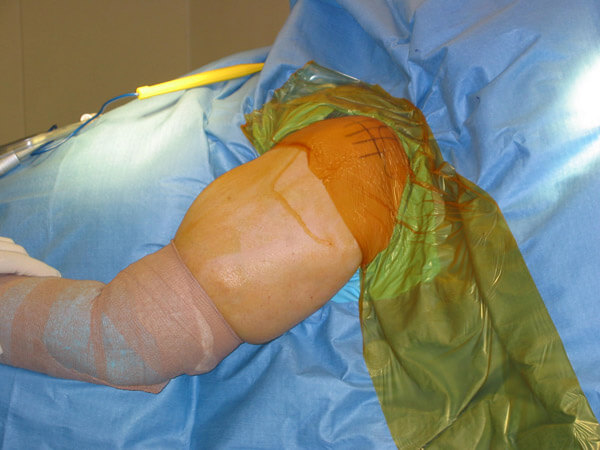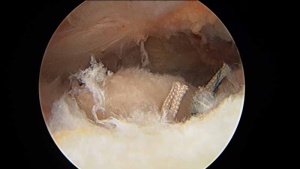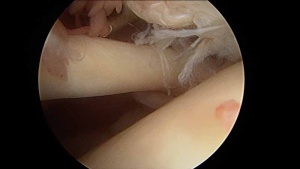What surgery are you suggesting?
I am suggesting that we operate on your shoulder to repair your torn rotator cuff tendon.
Is it done in an operating room?
Yes.
Will I be anesthetized?
One can have this surgery under a general anesthetic. The surgery can also be done with the shoulder anesthetized. That method involves numbing nerves to the shoulder. It is called an interscalene block. It is common to be sedated if the surgery is done with an interscalene block. The sedation is such that most patients will take a nap during the procedure.
Do I have to stay in the hospital?
No. This procedure is done on an outpatient basis most of the time.
What are the alternatives to surgery?
This surgery is done to improve function and decrease pain. If you find that your pain and function are acceptable, it is reasonable to decline surgery. There is not clear evidence that ignoring a rotator cuff tear of the shoulder will do damage to the shoulder over the long run. There is some evidence to show that over very long time frames, perhaps two decades or so, a rotator cuff deficient shoulder will wear out sooner than one with a working rotator cuff tendon.
Will my shoulder get stiff?
Almost all patients will lose a little flexibility.

About Your Doctor
How many of these have you done?
I have been performing surgery since 1981. I have performed about every type of operation one can do for shoulders at some point in my career. I am a board Certified Orthopedic Surgeon. I have been in practice at Jernigan Orthopedics and OrthoBiologics since 2022. I practiced with Piedmont Orthopedic associates for 34 years.
Risks
What are some of the things that could go wrong?
The anesthesia carries risks with it. The person who evaluates you for your anesthetic will discuss those risks with you. In general, complications from anesthesia are very, very rare, but they do exist.
How often does infection occur?
Approximately 1% of shoulder surgeries become infected soon after surgery.
What happens if there is an infection?
Infection will sometimes require that another operation be done on the shoulder. During that surgery the infection is washed out and intravenous antibiotics are often begun. Intravenous antibiotics may be necessary for 6 weeks, and sometimes oral antibiotics are needed for long-term use.
Could I die?
No surgery is absolutely safe. It is possible that one could die from any type of operation. The death rate from rotator cuff repair is profoundly low. I would estimate that it is less than 1 in 10,000. Other major events such as heart attack or stroke are extremely rare following this type of surgery.
Will it relieve my pain satisfactorily?
I find that about 90% of patients are very happy with the result after they have completely recovered from this type of surgery. Of the remaining 10%, most are improved, but some have reservations such as some mild pain or weakness. About 1 in 20 patients feel like the surgery was not worth doing.
Will I need a blood transfusion?
Almost certainly, no.
Will I have limitation on what I can do after it is healed?
No. It is safe to pursue all activities without restriction once completely healed.
A Common Sequence of Recovery
When will the sutures or staples be removed?
I use surgical glue. No sutures or staples require removal.
What is involved in this type of surgery?
In preparation of surgery, you will be asked to not eat or drink for at least 8 hours prior to surgery. Specific times to stop all food and drink will be given to you by your anesthesia professional. If you are on a drug that causes blood thinning such as Plavix or Coumadin, be sure to mention that to me. It may be important that those drugs be stopped well in advance of surgery. If you have rheumatoid arthritis or lupus and are on certain drugs for those conditions, they too may need to be stopped prior to surgery.
The anesthesia personnel who evaluate you for surgery will determine what lab work, if any, is needed. On the day of your surgery, you will be asked to arrive about two hours prior to your surgery time.
After surgery is over, you will need to remain at the facility for at least one hour. It is okay to eat or drink as soon as you feel like it. Your pain can be controlled by using the pain medication pills that I will prescribe for you. Pills will not eliminate all of the pain, but they will make it tolerable. Pain may be severe in the first few days. Pain can also be helped by the use of ice on the shoulder, sitting in an upright position as in a recliner and resting the arm in a position of maximal comfort to the side. I will probably recommend that exercises to your shoulder begin about two weeks after the operation.
When can I get it wet?
The surgical glue is waterproof, so it is okay to take a bath or a shower from the very first day.
Will I have to wear a sling?
Yes. The sling is worn until several weeks have passed from surgery, at your discretion. It can be removed to perform daily exercises and can also be removed when the arm is resting in a safe position while sitting. Whenever there is a risk where you might fall or trip, the sling should be on.
Is any special wound care required?
You will have a prettier scar if you protect it from sunlight for one year. That is easily done with a sunscreen applied along the scar. It is also okay to rub Vitamin E into the scar. The contents of a Vitamin E gel capsule can be expressed onto one’s fingertip, rubbed into the wound twice a day, and continued for about 2 months.
Arthroscopic Rotator Cuff Repair FAQs
What surgery are you suggesting?
Is it done in an operating room?
Yes.
Will I be anesthetized?
This is usually done under a general anesthetic. The surgery can also be done with just the shoulder anesthetized. That method involves numbing nerves to the shoulder. It is called an interscalene block. It is common to be put under general anesthesia if the surgery is done with an interscalene block. You and your anesthesia professional will decide which anesthetic is best for you.
Do I have to stay in the hospital?
No. This procedure is done on an outpatient basis.
What are the alternatives to surgery?
This surgery is done to improve function and decrease pain. If you find that your pain and function are acceptable, it is reasonable to decline surgery. There is not clear evidence that ignoring a rotator cuff tendon tear of the shoulder will do damage to the shoulder over the long run. There is some evidence to show that over very long time frames, perhaps two decades or so, a rotator cuff deficient shoulder will wear out sooner than one with a working rotator cuff tendon.
Will my shoulder get stiff?
Almost all patients will lose a little flexibility.
What is a rotator cuff repair?
A rotator cuff repair is a method of reattaching the tendon to the ball of the shoulder. (Generally, they tear away from the attachment point.)
About Your Doctor
How many of these have you done?
I have been performing surgery since 1981. I have performed about every type of operation one can do for shoulders at some point in my career. I am a board Certified Orthopedic Surgeon. I have been in practice at Jernigan Orthopedics and OrthoBiologics since 2022. I practiced with Piedmont Orthopedic associates for 34 years.
Risks
What are some of the things that could go wrong?
The anesthesia carries risks with it. The person who evaluates you for your anesthetic will discuss those risks with you. In general, complications from anesthesia are very, very rare, but they do exist. I find that about one out of 15 of my patients develops significant but temporary stiffness after this operation.
How often does an infection occur?
Approximately 1% of shoulder surgeries become infected soon after surgery.
What happens if there is an infection?
Infection will sometimes require that another operation be done on the shoulder. During that surgery the infection is washed out and intravenous antibiotics are often begun. Intravenous antibiotics may be necessary for 6 weeks. Oral antibiotics may be needed indefinitely.
Will my shoulder get stiff?
It takes about 8 months to gain maximal flexibility and strength of the shoulder after this operation. Some patients will take as long as a year to gain that maximum flexibility. Almost all patients recovering from this operation feel very tight in the first couple of months after the operation.
Could I die?
No surgery is absolutely safe. It is possible that one could die from any type of operation. The death rate from this surgery is profoundly low. I would estimate that it is less than 1 in 10,000. Other major events such as heart attack or stroke are extremely rare following this type of surgery.
Will I need a blood transfusion?
Almost certainly, no.
Will it relieve my pain satisfactorily?
I find that about 80% of patients are very happy with the result after they have completely recovered from this type of surgery. Of the remaining 20%, most are improved, but some have reservations such as mild pain or weakness. About one in 20 patients feel like the surgery was not worth doing.
Will I have limitations on what I can do after it is healed?
No. It is safe to pursue all activities without restriction once completely healed.
A Common Sequence of Recovery
What is involved in this type of surgery?
In preparation of surgery, you will be asked to not eat or drink for at least eight hours prior to surgery. Specific times to stop all food and drink will be given to you by your anesthesia professional. If you are on a drug that causes blood thinning such as Plavix or Coumadin, be sure to mention that to me. It may be important that those drugs be stopped well in advance of surgery. If you have rheumatoid arthritis or lupus and are on certain drugs for those conditions, they too may need to be stopped prior to surgery.
The anesthesia personnel who evaluate you for surgery will determine what lab work, if any, is needed. On the day of your surgery, you will be asked to arrive about two hours prior to your surgery time. After surgery is over, you will need to remain at the facility for at least one hour. It is okay to eat or drink as soon as you feel like it after surgery. Your pain can be controlled by using the pain medication pills that I will prescribe for you. Pills will not eliminate all of the pain, but they will make it tolerable. Pain may be severe in the first few days. Pain can also be helped by the use of ice on the shoulder, sitting in an upright position as in a recliner and resting the arm in a position of maximal comfort to the side. I will probably recommend that exercises to your shoulder begin about two weeks after the operation.
What about the overall recovery from this operation? How long does it take to completely recover?
Approximately 8 months is common.
Will I be hurting that long?
No. Generally within a week or two a person notices a significant diminution in their pain. They continue to gain further improvement after that.
How long will I need prescription pain medication?
Most patients will use it regularly in the first week and periodically until about three weeks following surgery. Often by week three, it is needed only at night.
When are the sutures removed?
I use surgical glue. No sutures or staples require removal.
When can I get it wet?
The surgical glue is waterproof, so it is okay to take a bath or a shower from the very first day.
Will I have to wear a sling?
Yes. A sling is provided at the time of surgery and the patient is instructed to use it for the first 6 weeks following surgery. It can be removed in certain environments such as the safety of your home. It is important that you are confident that no one will bump into you and that you will not trip if your sling is off. When the sling is off, it is important not to move the shoulder beyond the safe arc of motion.
Is any special wound care required?
Your scars will look prettier sooner if you rub vitamin E into them.


